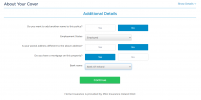Curious George
New Member
- Messages
- 1
Age: 38
Spouse’s/Partner's age: 34
Annual gross income from employment or profession: 90K
Annual gross income of spouse: 110K
Monthly take-home pay circ 9k after all deductions
Type of employment: Permanent
In general are you:
(b) saving?
Rough estimate of value of home: 480K
Amount outstanding on your mortgage: 140k
What interest rate are you paying? 2.25%
Other borrowings – None
Do you pay off your full credit card balance each month?
Yes
Savings and investments: circ 150k
Do you have a pension scheme? Yes, both making AVC's but not maximising the contribution limits for our age
Do you own any investment or other property? No
Ages of children: 4 & 2
Life insurance: Mortgage protection & death in Service
What specific question do you have or what issues are of concern to you?
We are currently in the process of moving out of Dublin and wondering whether to keep our current house as an investment. It's based in South Dublin so has potential to be used in future if our children were to go to college in Dublin. By selling the house we will end up with no mortgage and circ 100k in savings. If we keep the house we will have a new mortgage of 350k on top of the current mortgage. The current mortgage will move to a higher interest rate as it is no longer our PPR. The rent will cover the mortgage on the current home and doing some rough estimates we will make a small profit each year when taking all expenses into account but the cashflow will be circ 2k negative due to capital repayments on the mortgage.
Is it advisable to sell our current house and invest our surplus cash into something more diversified fund like and ETF or to keep the house as an investment?
Spouse’s/Partner's age: 34
Annual gross income from employment or profession: 90K
Annual gross income of spouse: 110K
Monthly take-home pay circ 9k after all deductions
Type of employment: Permanent
In general are you:
(b) saving?
Rough estimate of value of home: 480K
Amount outstanding on your mortgage: 140k
What interest rate are you paying? 2.25%
Other borrowings – None
Do you pay off your full credit card balance each month?
Yes
Savings and investments: circ 150k
Do you have a pension scheme? Yes, both making AVC's but not maximising the contribution limits for our age
Do you own any investment or other property? No
Ages of children: 4 & 2
Life insurance: Mortgage protection & death in Service
What specific question do you have or what issues are of concern to you?
We are currently in the process of moving out of Dublin and wondering whether to keep our current house as an investment. It's based in South Dublin so has potential to be used in future if our children were to go to college in Dublin. By selling the house we will end up with no mortgage and circ 100k in savings. If we keep the house we will have a new mortgage of 350k on top of the current mortgage. The current mortgage will move to a higher interest rate as it is no longer our PPR. The rent will cover the mortgage on the current home and doing some rough estimates we will make a small profit each year when taking all expenses into account but the cashflow will be circ 2k negative due to capital repayments on the mortgage.
Is it advisable to sell our current house and invest our surplus cash into something more diversified fund like and ETF or to keep the house as an investment?

